Nepal and Japan established diplomatic relations on 1 September 1956. The relations between Nepal and Japan is considered to have been opened by the seminal visit of revered Ekai Kawaguchi in 1899.
Relations between the two countries have developed based on true friendship, respect and mutual understanding. Japan, too, has been extending a helping hand to Nepal. Against this backdrop, Ishwar Dev Khanal from Khabarhub talked with Japanese Ambassador to Nepal, Mr. Masamichi Saigo, on issues ranging from trade, tourism, and bilateral cooperation. Excerpts:
How do you assess Nepal-Japan relations?
It was on 1st September 1956 when Japan and Nepal established their formal diplomatic relationship. Both Japan and Nepal were at the starting point of new nation-building in the new world order after WWII. It was a time when Japan and the Japanese people rose up again from chaos.
At the same time, in Nepal, Ranacracy had come to an end and B.P. Koirala started democratic reform. Japan and Nepal had had contacts with each other previously. For example through Rev. Ekai Kawaguchi’s religious and adventure visit to Tibet via Nepal in 1899, and when the Rana regime dispatched eight Nepalese students to Japan in 1902.
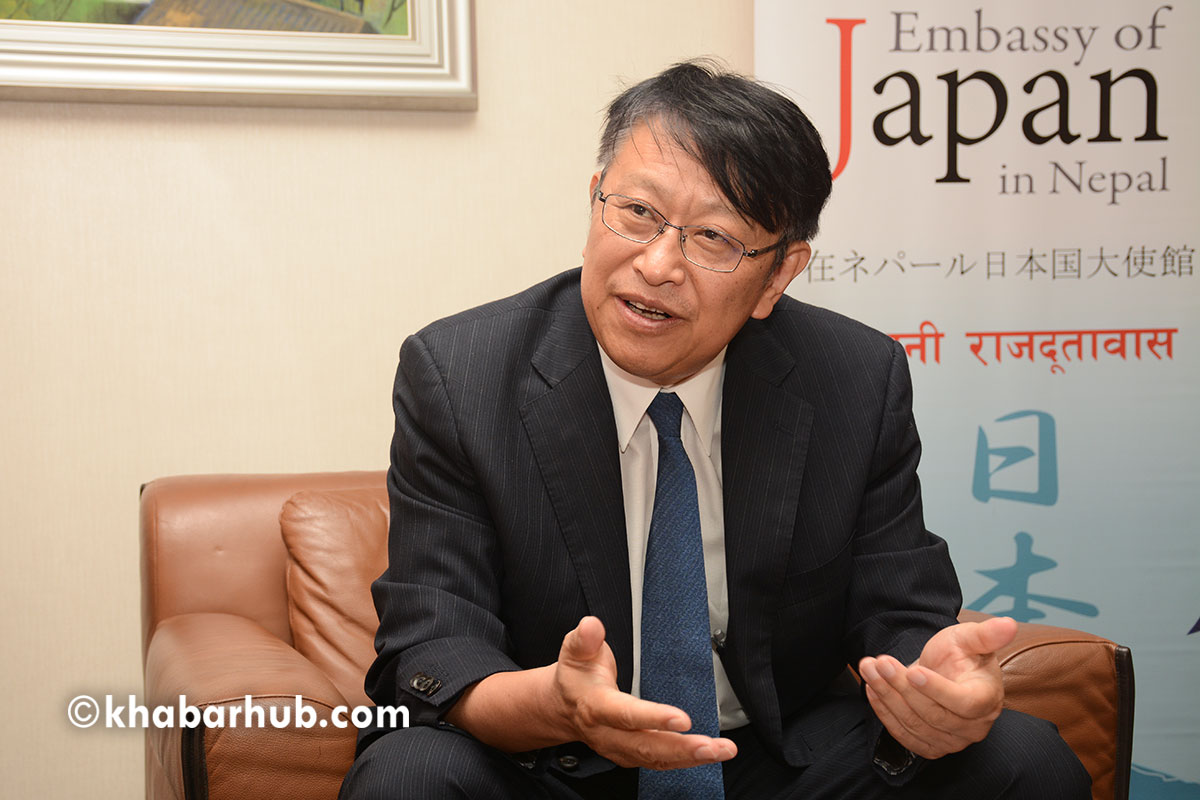
This year, 1956, was also the year when the world’s first-ever conquest of Manaslu took place by a Japanese team. I have learned that Nepal was engraved deeply in our hearts by this historic event too.
For the past six decades, the world has witnessed various upheavals, changes and developments. Japan is recognized for its economic progress and has been supporting the stability and prosperity of the world, including Asia, as a responsible member of the international community. Nepal also experienced changes in its political regimes and proceeded on the path to democratization and further development.
As of now, Japan and Nepal share common ideas through economic cooperation in various sectors such as economic development, democracy, and enhancement of governance. We are important partners for the stability and prosperity of the international society.
Japan and Nepal enjoy a friendly and long-term relationship, currently at its best ever, based on multi-faceted mutual interactions in business/economy, culture, and education.
How can we enhance people-to-people relations between Nepal and Japan?
People-to-people exchanges between Japan and Nepal have actually increased in recent years. According to statistics of May 2018 a total of 24,331 Nepali students are studying in Japan, a ranking of the 3rd largest number of students in Japan from a single country. More than 89,000 Nepali are currently staying in Japan for education and various business purposes.
What could be the areas of cooperation between the two countries in the future?
Nepal is aiming to become a middle-income country by 2030. Japan has been working together with Nepal to accomplish that aim. We are continuing our cooperation towards Nepal’s development goals. For example, we will continue to follow up earthquake rehabilitation and recovery programs and at the same time, we will assist Nepal in future disaster preparedness, where we can share our own experiences regarding natural disasters.
For poverty reduction, we can support the agriculture sector, i.e. food productivity and income generation. We see that Nepal has potential in various areas such as agriculture, tourism, human capital, etc.
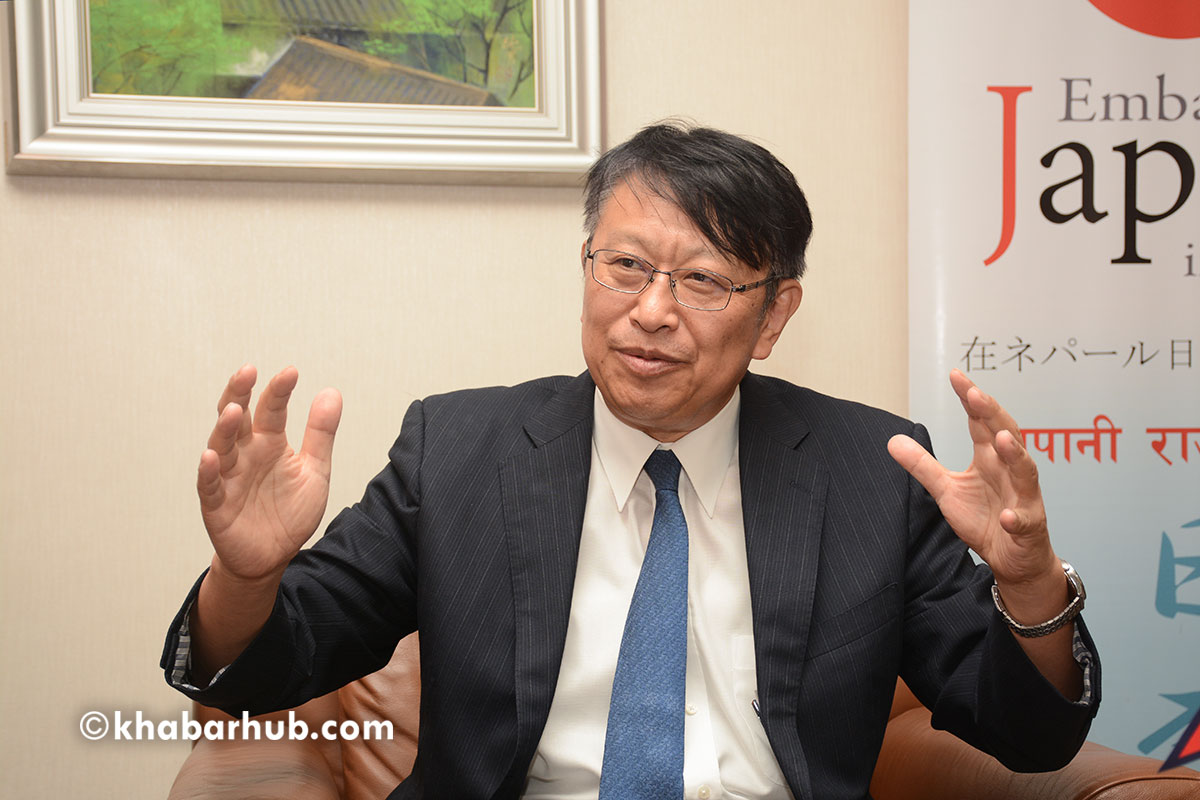
How can both nations develop a long-term partnership?
Japan has been working with Nepal as a long-term friend to support Nepal’s development while enjoying an amicable diplomatic relationship and a friendly people-to-people exchange. The Government of Japan wishes to further develop our bilateral relationship so that our two countries will become mutually beneficial partners in the private business sector too.
Due to the geographical reality that 85% of Nepal’s land is mountains, building transportation routes and a major industrial area has been not straightforward. Nepal’s hydropower resources, regarded as among the world’s biggest, are yet to be fully developed.
The diverse agricultural products of Nepal have great potentials, even though due to the lack of transportation and facilities to conduct primary processing, they are not well-known in the international market. The Nepalese economy is sustained by the huge amount of remittance from migrant workers. It seems to us that Nepal has to find a sustainable economic growth and development model which fits her best.
Japan developed to compete with Western countries from the end of the 19th century to the first half of the 20th century, and reconstructed herself from the ashes of war, then transformed from a recipient of foreign aid into its provider.
As a true and best friend of Nepal, Japan will continue to work with Nepal by deepening and widening our bilateral relationship further to achieve the vision of “Prosperous Nepal, Happy Nepali” through economic and quality technical cooperation, promoting investment, and towards preservation of the cultural heritage of this beautiful country.
What areas in Nepal appear suitable for investors?
Nepal is a country that possesses immense potential for investment and development. There exists potential through its abundant natural resources and the attractive flora and fauna. To capitalize on the good amount of water resources, the hydropower sector will be one of the attractive sectors for investment with a view to the future prospect of energy export.
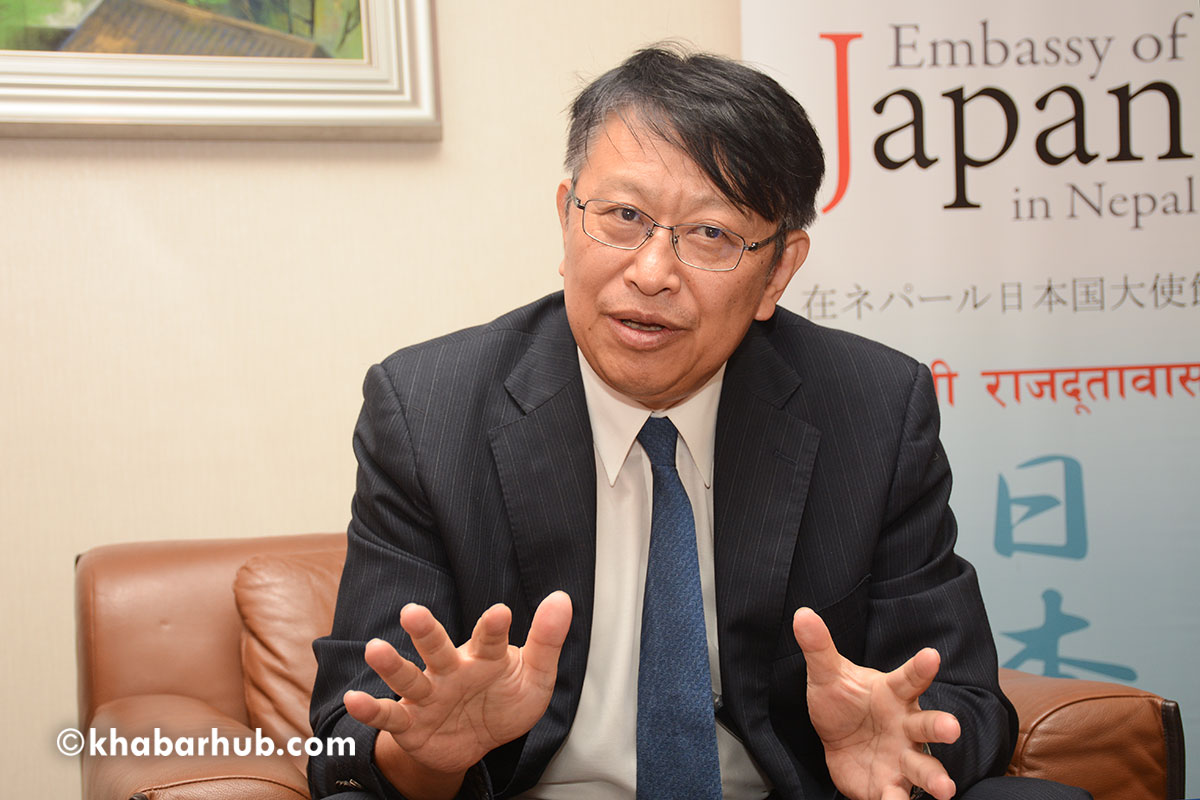
Another area is the tourism sector. As Nepal is endowed with natural beauty, Nepal could develop many products in the tourism sector to attract people from all around the world. The manufacturing sector also has good prospects as there exist two giant neighboring markets.
Another area that has not been explored much in Nepal is the mining sector. Recently there was some news regarding iron mines in Nawalparasi, so this might be another area for investors.
Are there any hurdles that Japanese investors face in Nepal?
With the end of the transition period and political stability in the county, Nepal has good potential to offer as an attractive destination for investment. However, Japanese investors often find the administration process slow and troublesome compared to other FDI destinations in Asia.
We also pay keen attention to the protection of the intellectual property rights of investors. In Nepal, the law for this is yet to be finalized. Recent hikes in the minimum thresholds of FDI certainly discouraged many small-medium sized Japanese investors who have rich experience and high skills.
I feel regret that Nepal industries are missing opportunities for win-win partnerships and for acquiring know-how from such trustworthy Japanese companies due to the hike in the FDI minimum threshold.
Japan has been supporting Nepal’s development. What’s your perspective on the Government of Japan’s development aid to Nepal?
Our ODA started in 1959. We believe Nepal’s development and stability contribute to regional stability. Nepal’s geopolitical role is very important in this region. Japan’s development aid, as a long term friend to Nepal, has contributed to improving the lives of people, basic human needs, education, transport infrastructure, power supply, etc. which covers various aspects of Nepal’s development.
Could you please tell us about the priority sectors of Japan’s aid?
Japan’s basic policy of assistance is for a balanced and sustainable economic growth, aiming at Nepal’s graduation from the LDC status. We set up four (4) priority areas: recovery works and disaster-resilient nation-building in both structural and non-structural aspects; the building of social and economic institutions which directly lead to economic growth and the improvement of national livelihoods; poverty reduction and quality of life improvement, and lastly governance enhancement and basic framework development for democracy.
Nepal is observing Visit Nepal 2020 aimed at bringing in around 2 million tourists. How do you see the tourism prospects in Nepal?
Nepal needs to improve infrastructure to attract more tourists. For example, upgrading the international airport is one of the elements. Better sanitary conditions and a public toilet system might seem like tiny things, but I’m aware that those changes and improvements can easily attract Japanese tourists.
Many people in Japan are not fully aware of the natural beauty and rich cultural heritage in Nepal, however, I am sure many of them will be keen to visit this country. We look forward to hearing more from the Nepal Tourism Board and Visit Nepal 2020 for the further plans for the Japanese markets.
We also can hope for an increased number of Japanese tourists through Nepal Airlines’ resumption of direct flights to Japan from late August this year.
Could you please give us a brief summary of the new status of residence “Specified Skilled Worker”?
Because of serious labor shortages in Japan, the Government of Japan determined the Basic Policy and Field-Specific Operation Policies on Operation of the System of the New Status of Residence, “Specified Skilled Worker,” introduced in April 2019. The specified skilled workers require considerable knowledge of, or experience in, their field and will be accepted in 14 industry fields.
Japan and Nepal signed the Memorandum of Cooperation (MOC) on a Basic Framework for Information Partnership for Proper Operation of the System pertaining to Foreign Human Resources with the Status of Residence of “Specified Skilled Worker” in March 2019.
The purpose of this MOC is to establish a basic framework for information partnership in order to ensure smooth and proper sending and accepting of specified skilled workers, in particular, the elimination of malicious intermediary organizations and brokers, and the prohibition of contracts that stipulate the collection of guarantee deposits or monetary penalties.
The governments of Japan and Nepal will take the necessary measures to prevent these kinds of organizations operating in this field.
The applicable skills level and the level of Japanese proficiency are to be confirmed through a skills exam and a language exam. Currently, the concerned ministry and institutions in Japan are promoting the preparation of the implementation of the skills exam and the language exam for the care worker field in Nepal.
Do you have any message to share with the Nepali people?
Both Japan and Nepal share common Asian values. It is my pleasure to mention here that Japan has been one of the major development partners for Nepal, providing its ODA to Nepal’s development in the wide areas like infrastructure, education, health, hydropower, transport, and drinking water, to name a few sectors.
We will continue such support in the future – and wish to see Nepal promoted to a ‘developing country’ from its current LDCs status.


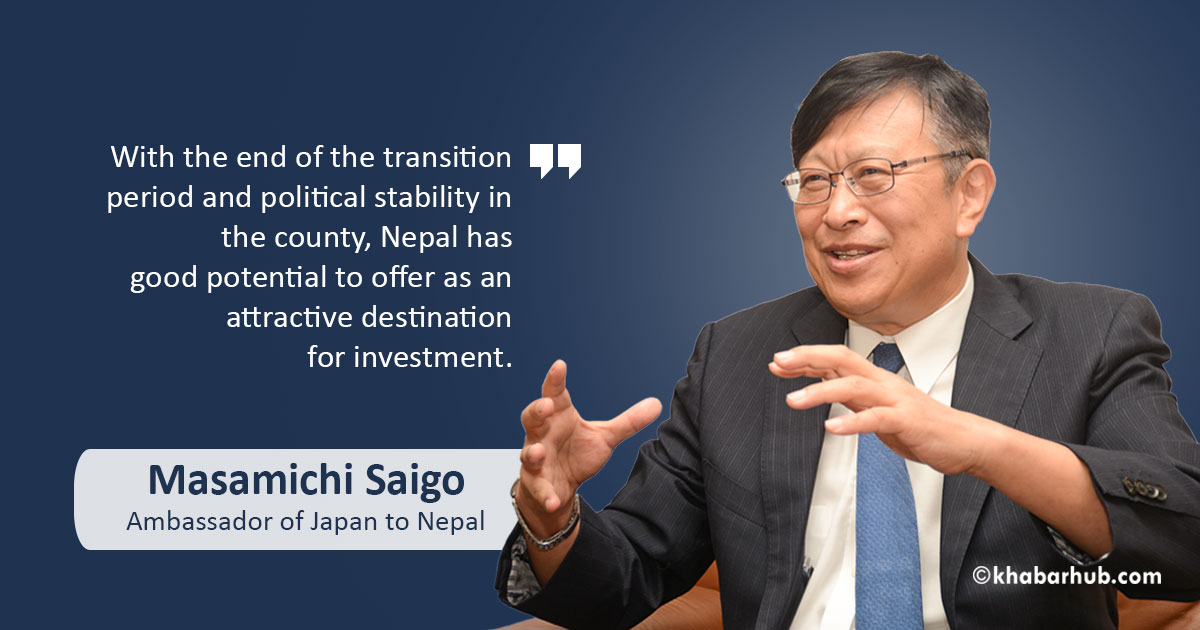

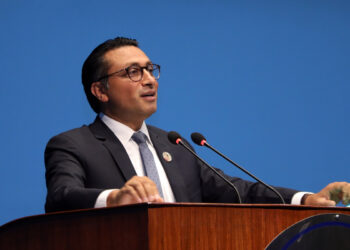




Comment